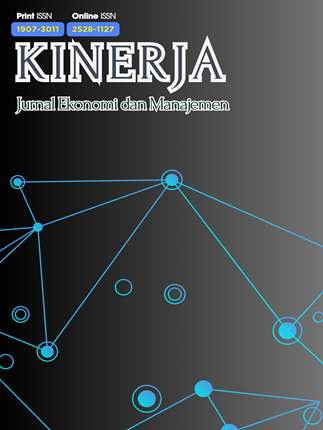Pengaruh knowledge, skills, engagement dan university social responsibility terhadap kepuasan mahasiswa
DOI:
https://doi.org/10.30872/jkin.v18i1.7846Keywords:
knowledge, skills, engagement, USR, kepuasanAbstract
Penelitian ini bertujuan untuk mengetahui pengaruh knowledge, skills, engagement dan university social responsibility (USR) terhadap service quality dan kepuasan mahasiswa UNP. Populasi dalam penelitian ini adalah mahasiswa yang berstatus aktif dan minimal sudah menempuh pendidikan selama 1 tahun. Jumlah sampel penelitian sebanyak 277 responden. Data dikumpulkan melalui kuesioner dengan menggunakan skala Likert dan dianalisis menggunakan Partial Least Square (PLS) dengan software SmartPLS. Hasil penelitian menunjukkan USR dengan service quality dan service quality dengan kepuasan mempunyai hubungan yang signifikan positif, sementara variabel lainnya tidak terbukti mempunyai pengaruh yang signifikan. Hal ini mengindikasikan bahwa universitas dapat memberikan kepuasan bagi mahasiswa melalui peningkatan program USR.References
Arambewela, R dan Hall, J. (2006). A comparative analysis of international education satisfaction using SERVQUAL. Journal of Services Research, 6, 141.
Baars, M dan Wijnia, L. (2018). The relation between task-specific motivational profiles and training of self-regulated learning skills, Learning and Individual Differences, Vol. 64, 125–137.
Botma, Y., Van Rensburg, G., Coetzee, I., & Heyns, T. (2015). A conceptual framework for educational design at modular level to promote transfer of learning. Innovations in Education & Teaching International, 52(5), 499–509.
Chen, Y., Wang, Y., & Chen, N. S. (2014). Is FLIP enough? Or should we use the FLIPPED model instead? Computers & Education, 79, 16–27.
D'Alessio, F. A., Avolio, B. E., & Charles, V. (2019). Studying the impact of critical thinking on the academic performance of executive MBA students. Thinking Skills and Creativity, 31, 275–283.
Esfijani, A., Hussain, F., & Chang, E. (2013). University social responsibility ontology. International Journal of Engineering Intelligent Systems, 21(4), 271-281.
Fredricks, J. A., Wang, M. T., Linn, J. S., Hofkens, T. L., Sung, H., Parr, A., et al. (2016). Using qualitative methods to develop a survey measure of math and science engagement. Learning and Instruction, 43, 5–15.
Goldman, S. R., & Scardamalia, M. (2013). Managing, understanding, applying, and creating knowledge in the information age: Next-generation challenges and opportunities. Cognition and Instruction, 31(2), 255–269.
Irawan, H. 2009. 10 Prinsip Kepuasan Pelanggan. Jakarta: Elex Media Komputindo.
Lewis, RG, Smith. 1994. Total Quality in Higher Education. Florida: St. Lucie Press.
Lopes, A. P., & Soares, F. (2018). Perception and performance in a flipped Financial Mathematics classroom. International Journal of Management in Education, 16(1), 105–113.
Luo, X., & Bhattacharya, C. B. (2006). Corporate social responsibility, customer satisfaction, and market value. Journal of marketing, 70(4), 1-18.
Murillo-Zamorano, L, Sanchez J, Godoy-Caballero A. (2019). How the flipped classroom affects knowledge, skills, and engagement in higher education: Effects on students' satisfaction. Computers and Education, 141(2019), 103608.
Murillo-Zamorano, L. R., & Montanero, M. (2018). Oral presentations in higher education: A comparison of the impact of peer and teacher feedback. Assessment & Evaluation in Higher Education, 43(1), 138–150.
O'Flaherty, J., & Phillips, C. (2015). The use of flipped classrooms in higher education: A scoping review. The Internet and Higher Education, 25, 85–95.
Sackin, S. (2018). What gen Z wants in a career (and how to give it to them). Forbes Agency Council. Retrieved from https://goo.gl/5g7Yzp.
Santos G, Marques C, Justino E, Mendes L. (2020). Understanding social responsibility’s influence on service quality and student satisfaction in higher education. Journal of Cleaner Production, https://doi.org/10.1016/j.jclepro.2020.120597
Tjiptono, F. 2004. Manajemen Jasa, Edisi Pertama. Yogyakarta: Andi Offset.
Vázquez, J. L., L Aza, C., & Lanero, A. (2014). Students’ experiences of university social responsibility and perceptions of satisfaction and quality of service. Ekonomski Vjesnik/Econviews: Review of contemporary business, entrepreneurship and economic issues, 28(S), 25-39.
Zeithaml, V.A., M.J. Bitner, D.D. Gremler. 2013. Services Marketing: Integrating Customer Focus Across the Firm6thed. Boston: Mc.Graw-Hill.


